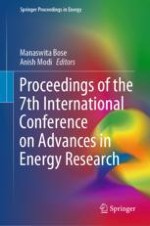
2021 | OriginalPaper | Chapter
Determination of Steam Energy Factor for Wort Kettle as a Tool for Optimization of the Steam Energy
Authors : Shripad Kulkarni, Alex Bernard
Published in: Proceedings of the 7th International Conference on Advances in Energy Research
Publisher: Springer Singapore
Activate our intelligent search to find suitable subject content or patents.
Select sections of text to find matching patents with Artificial Intelligence. powered by
Select sections of text to find additional relevant content using AI-assisted search. powered by